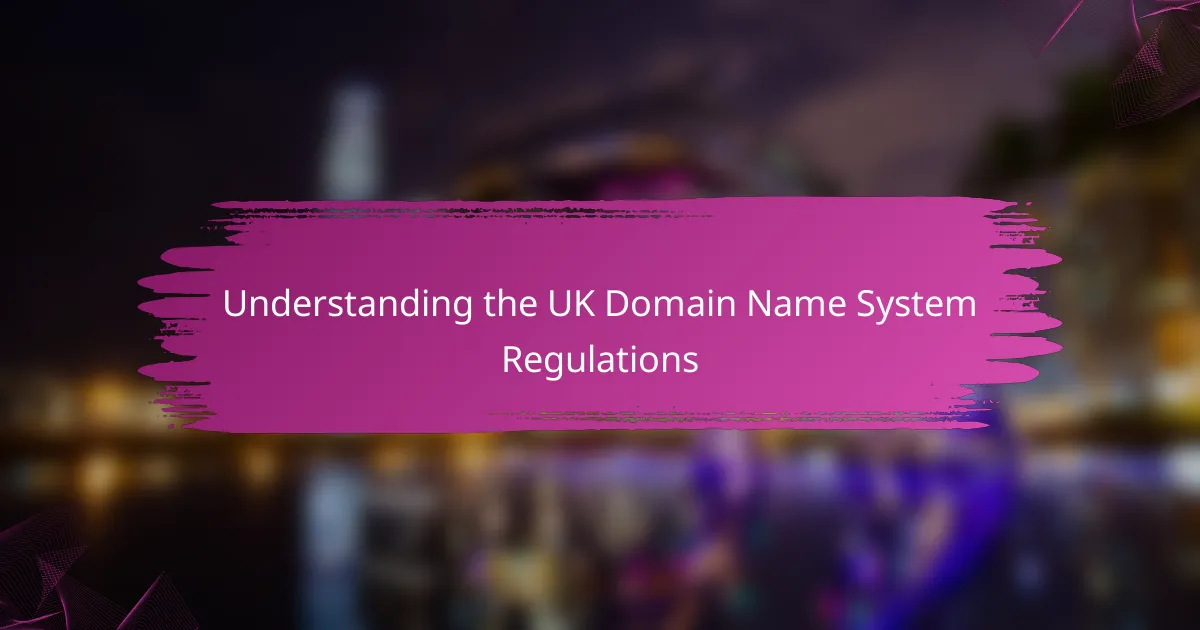Understanding the UK Domain Name System Regulations is vital for anyone interested in registering or managing a domain name in the UK. These regulations encompass specific registration requirements, compliance obligations, and established dispute resolution processes that must be adhered to. Non-compliance can result in serious consequences, such as financial penalties and domain suspension, underscoring the importance of following these guidelines.
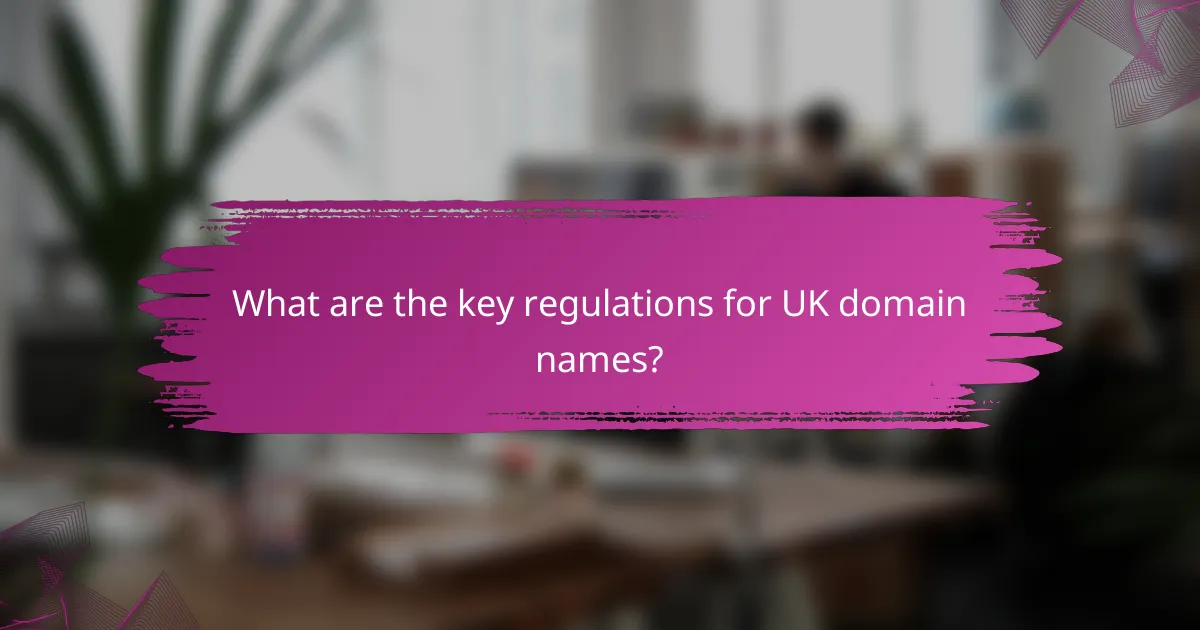
What are the key regulations for UK domain names?
The key regulations for UK domain names include specific registration requirements, compliance obligations, and established dispute resolution processes. Understanding these regulations is essential for anyone looking to register or manage a domain name in the UK.
Registration requirements
To register a domain name in the UK, individuals or businesses must provide accurate information, including their name, address, and contact details. Registrants must also ensure that the domain name complies with the naming conventions set by the relevant registry, such as Nominet for .uk domains.
Additionally, registrants should be aware of restrictions on certain names, such as those that are offensive or misleading. It’s advisable to check the availability of a desired domain name and consider securing multiple variations to protect brand identity.
Compliance obligations
Domain name holders in the UK must adhere to various compliance obligations, including maintaining accurate registration details and responding to inquiries from the registry. Failure to comply can result in suspension or deletion of the domain.
Moreover, registrants should ensure that their domain usage aligns with UK laws, such as those governing intellectual property and consumer protection. Regularly reviewing compliance with these obligations can help avoid legal issues and maintain good standing with the registry.
Dispute resolution processes
The UK has established specific dispute resolution processes for domain name conflicts, primarily handled through Nominet’s Dispute Resolution Service (DRS). This service provides a streamlined method for resolving disputes over .uk domain names without resorting to court.
Parties involved in a dispute must follow a structured process that includes filing a complaint, responding to the complaint, and potentially participating in a hearing. Understanding the DRS procedures and timelines is crucial for effectively navigating disputes and protecting domain rights.
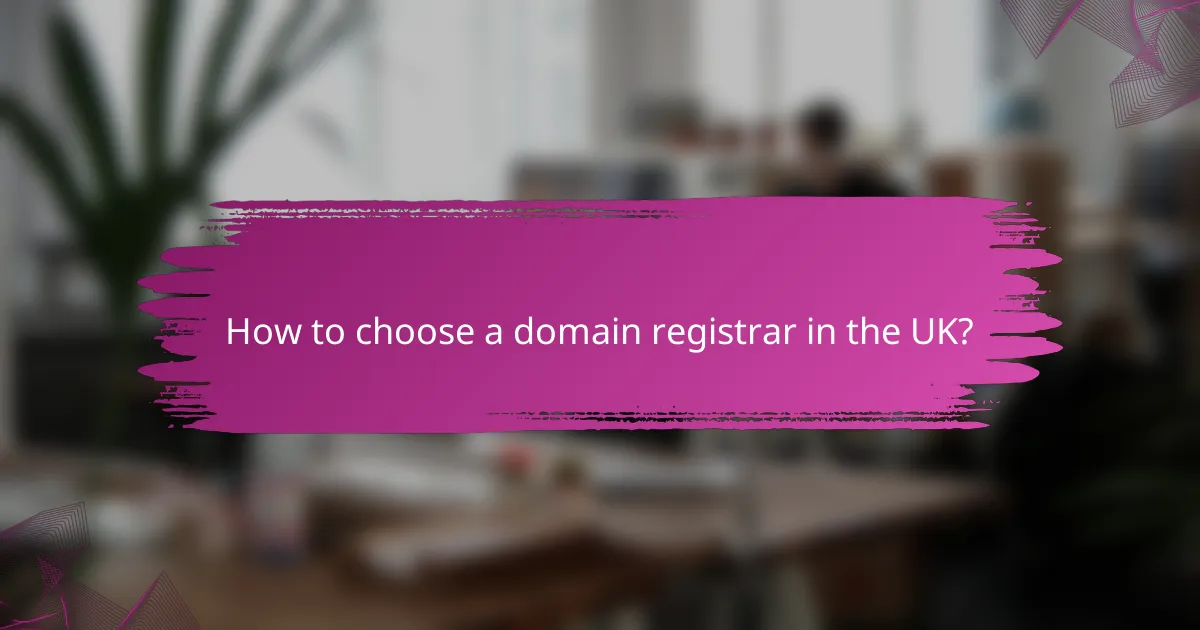
How to choose a domain registrar in the UK?
Choosing a domain registrar in the UK involves evaluating their accreditation, pricing, and customer support. A reliable registrar should be accredited by Nominet, offer transparent pricing, and provide responsive support to assist with any issues.
Accredited registrars
In the UK, it’s crucial to select a domain registrar that is accredited by Nominet, the official registry for .uk domain names. Accredited registrars are authorized to register and manage .uk domains, ensuring compliance with UK regulations.
To find a list of accredited registrars, visit the Nominet website. This list includes well-known companies that meet the necessary standards for security and service quality.
Pricing structures
Domain registration prices in the UK can vary widely depending on the registrar and the specific domain extension. Basic .co.uk domains typically range from £5 to £15 per year, while more specialized domains may cost significantly more.
When comparing registrars, look for any hidden fees, such as renewal costs or transfer charges. Some registrars may offer discounts for multi-year registrations or bundle services like web hosting.
Customer support options
Effective customer support is essential when choosing a domain registrar. Look for registrars that provide multiple support channels, such as phone, email, and live chat, to ensure you can get help when needed.
Check customer reviews to gauge the quality of support offered. A registrar with responsive and knowledgeable support can save you time and frustration if issues arise with your domain.
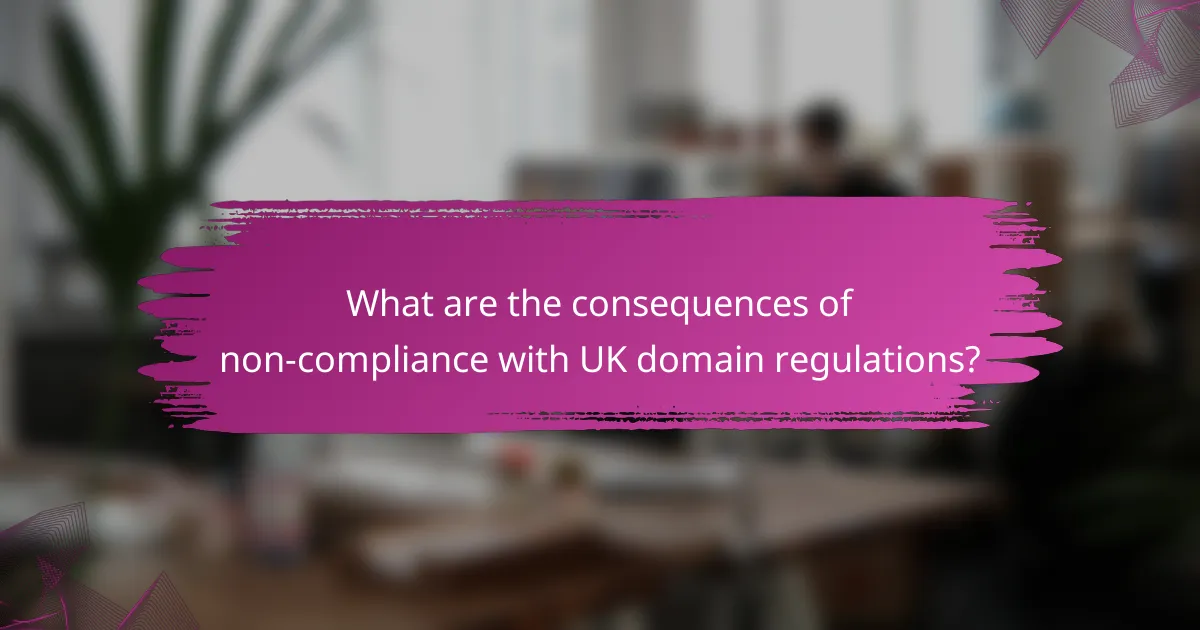
What are the consequences of non-compliance with UK domain regulations?
Non-compliance with UK domain regulations can lead to significant repercussions, including financial penalties, suspension of domain names, and potential legal disputes. These consequences can affect both individuals and businesses, making adherence to regulations crucial.
Fines and penalties
Violating UK domain regulations can result in fines that vary depending on the severity of the non-compliance. Penalties may range from hundreds to thousands of pounds, depending on the nature of the violation. For example, failing to provide accurate registration information can incur substantial fines.
Additionally, regulatory bodies may impose administrative fees for processing complaints or disputes related to non-compliance. It’s essential to stay informed about the specific regulations applicable to your domain to avoid these financial repercussions.
Domain suspension risks
One of the most immediate consequences of non-compliance is the risk of domain suspension. If a domain is found to be in violation of regulations, the registrar may temporarily or permanently suspend the domain name. This can disrupt online presence and business operations significantly.
To mitigate this risk, regularly review your domain registration details and ensure compliance with all relevant regulations. Promptly addressing any issues can help maintain your domain’s active status.
Legal disputes
Non-compliance can also lead to legal disputes, particularly if a domain is registered in bad faith or infringes on existing trademarks. Such disputes may result in costly legal battles and potential loss of the domain name. Engaging in proper due diligence before registering a domain can help prevent these issues.
In the event of a dispute, it is advisable to seek legal counsel experienced in domain law to navigate the complexities of the situation effectively. Understanding your rights and responsibilities under UK domain regulations is crucial to avoid legal entanglements.
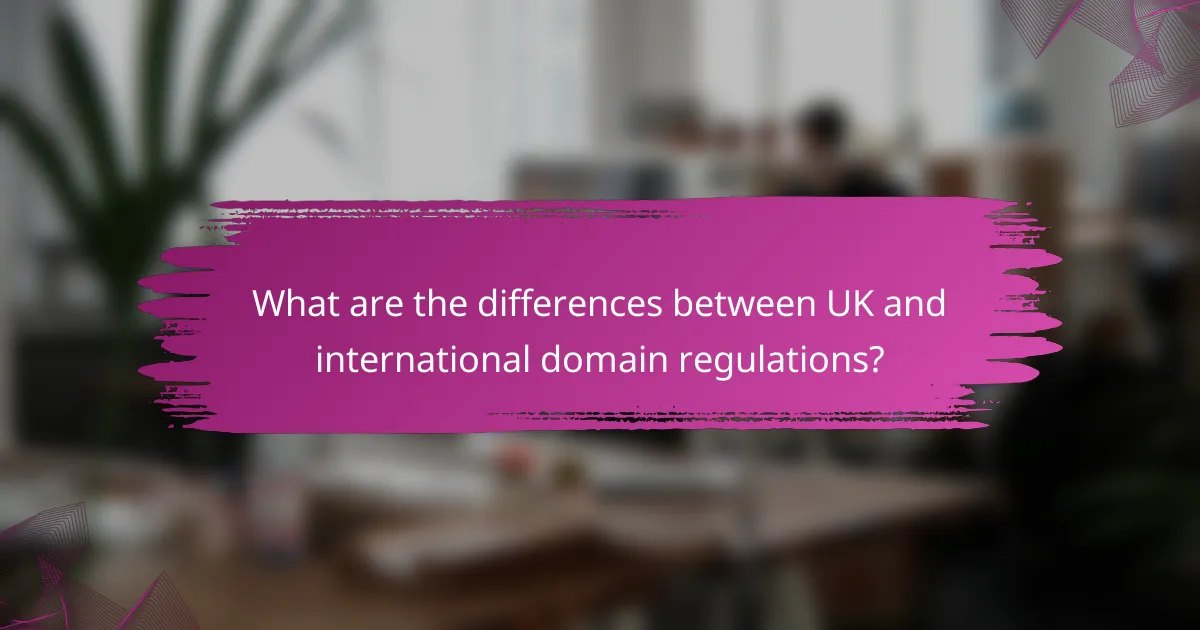
What are the differences between UK and international domain regulations?
The UK domain regulations differ from international standards primarily in their governance and specific compliance requirements. While international regulations often focus on broader principles, UK regulations enforce stricter local rules, particularly regarding registration and dispute resolution.
UK-specific rules
In the UK, domain names must comply with specific rules set by the Internet Corporation for Assigned Names and Numbers (ICANN) and the UK’s domain registry, Nominet. Registrants must provide accurate contact information and adhere to guidelines regarding the use of certain second-level domains, such as .co.uk or .org.uk.
Additionally, UK regulations emphasize the importance of protecting intellectual property rights. Registrants should be aware of the potential for disputes and the processes available for resolving them, such as the Nominet Dispute Resolution Service (DRS).
EU regulations impact
Although the UK has exited the EU, some EU regulations still influence UK domain practices, particularly concerning data protection. The General Data Protection Regulation (GDPR) continues to affect how registrars handle personal data, requiring transparency and consent in data collection.
Moreover, businesses operating in both the UK and EU must navigate differing regulations, which can complicate domain management. Understanding these differences is crucial for compliance and avoiding legal issues.
Global domain management
Managing domains globally requires awareness of various regulations and practices across different jurisdictions. While UK regulations are stringent, other countries may have more lenient or different requirements, affecting how domains are registered and maintained.
To effectively manage domains internationally, businesses should consider using a centralized domain management platform. This can streamline compliance with local laws and simplify the renewal and transfer processes across multiple regions.
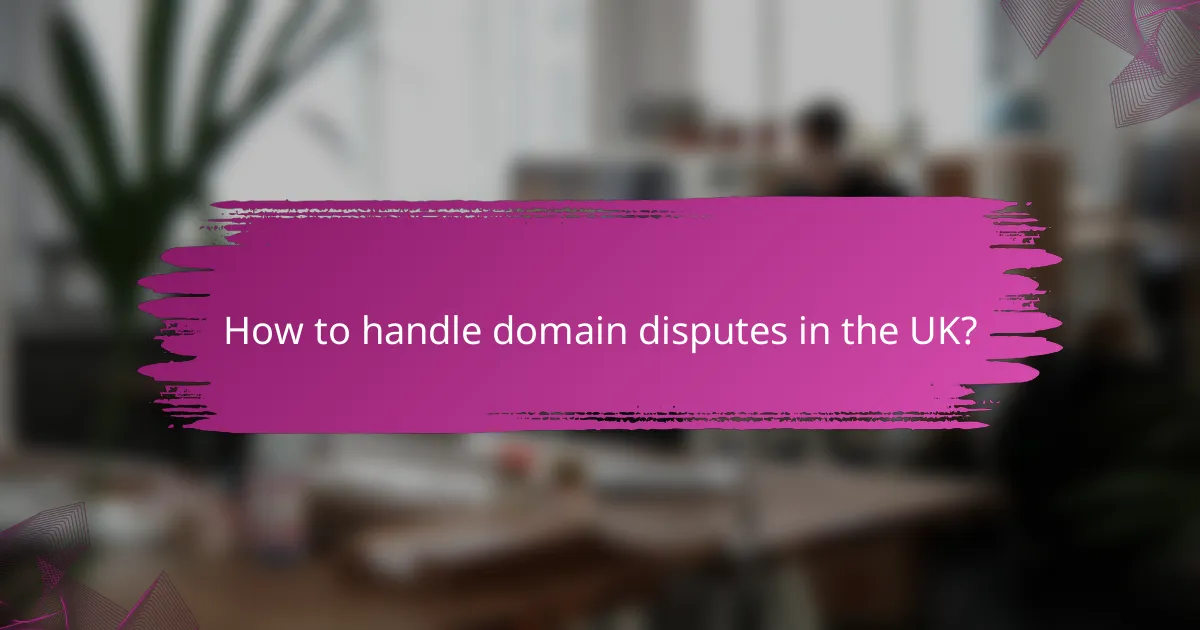
How to handle domain disputes in the UK?
To handle domain disputes in the UK, parties can utilize Alternative Dispute Resolution (ADR) processes or pursue legal proceedings. Understanding the options available can help resolve conflicts efficiently and effectively.
Alternative Dispute Resolution (ADR)
ADR is a preferred method for resolving domain disputes in the UK, often being quicker and less costly than traditional litigation. The UK domain registry, Nominet, offers an ADR process specifically designed for disputes involving .uk domains.
During the ADR process, an independent adjudicator reviews the case and makes a binding decision. This method is typically faster, with resolutions often reached within weeks, compared to months or years in court.
Legal proceedings
If ADR does not resolve the dispute, parties may opt for legal proceedings in the UK courts. This route can be more formal and may involve higher costs and longer timelines.
Legal action can be initiated in the High Court, where the claimant must demonstrate their rights to the domain name. This process can take several months, and parties should be prepared for potential appeals.
Best practices for resolution
To effectively resolve domain disputes, parties should first attempt to communicate directly to find a mutually agreeable solution. Keeping records of all communications can be beneficial if the dispute escalates.
Additionally, understanding the relevant regulations and being aware of the terms of service of the domain registrar can provide clarity on rights and responsibilities. Seeking legal advice early in the process can also help navigate complex issues.
